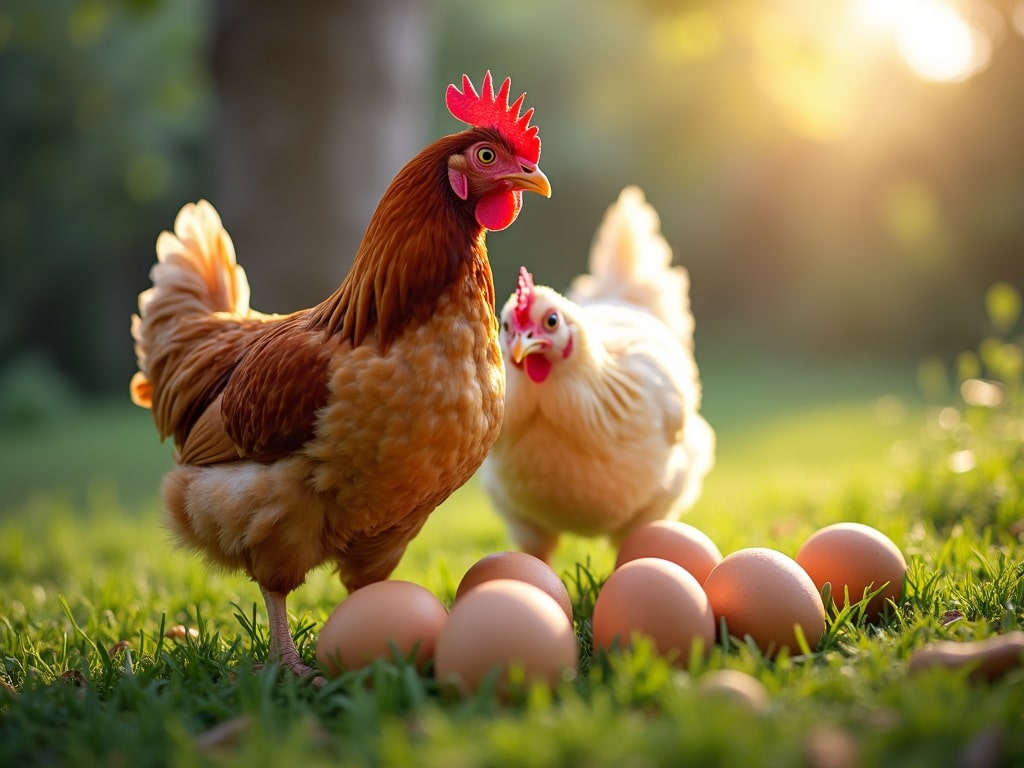Backyard Chickens for Eggs: The Ultimate Beginner's Guide
Imagine stepping into your backyard, a basket in hand, and collecting fresh, warm eggs from your own flock of chickens. The yolks are a vibrant orange, promising a taste far superior to anything you can find in the supermarket. Raising backyard chickens for eggs is a rewarding experience that connects you to your food source, promotes self-sufficiency, and provides a delightful daily ritual. This guide is your comprehensive roadmap to successfully starting and maintaining your own backyard flock.
Benefits of Raising Backyard Chickens for Eggs
Beyond the unparalleled taste of fresh eggs, keeping backyard chickens offers a multitude of benefits:
- Superior Egg Quality: Backyard chickens produce eggs with richer yolks and thicker shells, packed with nutrients.
- Pest Control: Chickens are natural foragers, happily devouring insects and larvae that can plague your garden.
- Garden Enrichment: Chicken manure is a valuable fertilizer, enriching your soil and promoting healthy plant growth.
- Composting Assistance: Chickens can help turn your compost pile, accelerating decomposition and creating nutrient-rich compost.
- Educational Opportunity: Raising chickens is a fantastic learning experience for children, teaching them about responsibility, animal care, and the food cycle.
- Companionship: Chickens have unique personalities and can become surprisingly affectionate pets.
Are Backyard Chickens Right for You? (Considerations)
While the benefits are numerous, raising backyard chickens also requires commitment and careful consideration:
- Time Commitment: Daily tasks include feeding, watering, collecting eggs, and cleaning the coop.
- Financial Investment: Initial costs include the coop, run, feeders, waterers, and chicks. Ongoing expenses include feed and potential veterinary care.
- Space Requirements: Chickens need adequate space to roam and forage, both inside the coop and in a secure run.
- Noise Levels: While generally not excessively loud, chickens can be vocal, especially in the morning.
- Predator Concerns: Protecting your flock from predators such as foxes, raccoons, and hawks is crucial.
- Potential Mess: Chicken droppings can be messy and require regular cleaning..
Carefully weigh these factors before embarking on your backyard chicken adventure. To continue learning about raising Backyard Chickens, check out: The Ultimate Guide to Raising Backyard Chickens for other helpful details.
Checking Local Laws and Regulations
Before acquiring chickens, it's essential to research and comply with local ordinances and regulations. Many municipalities have specific rules regarding:
Discover Proven Techniques to Preserve Your Food Year-Round and Enjoy Less Waste with More Freshness
- Number of Chickens Allowed: Some areas limit the number of chickens you can keep based on lot size.
- Rooster Restrictions: Roosters are often prohibited due to their loud crowing.
- Coop Placement: Setback requirements may dictate how far the coop must be from property lines.
- Permitting Requirements: Some municipalities require permits for keeping livestock.
- HOA Regulations: If you live in a homeowner's association, be sure to review their rules regarding chickens.
Contact your local city hall or county government to obtain the necessary information and ensure compliance.
Choosing the Right Chicken Breed for Egg Production
Selecting the right chicken breed is crucial for maximizing egg production. Some breeds are known for their prolific laying abilities:
- Rhode Island Red: A hardy and reliable breed, producing approximately 250-300 large brown eggs per year.
- Leghorn: Known for their exceptional egg-laying capabilities, laying around 300 white eggs per year.
- Australorp: A dual-purpose breed, prized for both meat and egg production. They lay approximately 250 brown eggs per year.
- Plymouth Rock: A docile and friendly breed, laying around 200 brown eggs per year.
- Golden Comet: A hybrid breed specifically bred for high egg production, laying approximately 300 brown eggs per year.
Consider your climate, space constraints, and desired egg color when choosing a breed. Researching different breeds will help you find the perfect fit for your needs.
How Many Chickens Should You Get?
A good rule of thumb is to start with 3-6 chickens. This will provide a steady supply of eggs for a small family. Each hen typically lays between 4-7 eggs per week, depending on the breed, age, and season.
Consider these factors when determining the number of chickens:
- Egg Consumption: How many eggs does your household consume weekly?
- Space Availability: Do you have enough space for a larger flock?
- Time Commitment: Are you prepared to care for more chickens?
- Local Regulations: What are the limits on the number of chickens allowed in your area?
Start small and gradually expand your flock as needed.
Setting Up Your Chicken Coop
The chicken coop is your flock's home, providing shelter from the elements and protection from predators. A well-designed coop is essential for their health and well-being.
Key considerations for coop design include:
- Size: Provide at least 4 square feet of space per chicken inside the coop.
- Ventilation: Proper ventilation is crucial for preventing moisture buildup and respiratory problems.
- Roosting Bars: Chickens need roosting bars to perch on at night. Provide at least 8-10 inches of roosting space per chicken.
- Nesting Boxes: Provide one nesting box for every 3-4 hens. Nesting boxes should be dark, quiet, and comfortable.
- Accessibility: Ensure easy access for cleaning and egg collection.
- Security: Construct the coop with sturdy materials to protect against predators. Bury wire mesh around the perimeter to prevent digging.
You can purchase a pre-built coop or build your own. Numerous coop plans are available online and in books.
Essential Chicken Coop Equipment
In addition to the coop structure itself, you'll need essential equipment to care for your flock:
- Feeders: Choose a feeder that minimizes waste and prevents contamination.
- Waterers: Provide a clean and constant source of fresh water. Nipple waterers are a hygienic option.
- Bedding: Use absorbent bedding materials such as straw, wood shavings, or hemp bedding to keep the coop clean and dry.
- Nesting Box Materials: Provide soft and comfortable nesting materials such as straw or shredded paper.
- First Aid Kit: Keep a well-stocked first aid kit on hand for treating minor injuries.
Creating a Chicken Run
A chicken run provides a safe and enclosed outdoor space for your chickens to exercise, forage, and socialize. The run should be:
- Spacious: Provide at least 8-10 square feet of run space per chicken.
- Secure: Enclose the run with sturdy wire mesh to prevent predators from entering. Extend the mesh underground to prevent digging.
- Covered: Consider covering the run with netting or a roof to protect against aerial predators and harsh weather.
- Entertaining: Provide dust bathing areas, logs, and other enrichment items to keep your chickens entertained.
Consider rotating the run to allow the chickens to forage on fresh grass and prevent soil depletion.
What Do Chickens Eat? (Chicken Feed and Supplements)
A balanced diet is essential for healthy chickens and optimal egg production. The foundation of your flock's diet should be a high-quality chicken feed formulated for laying hens.

Feed types include:
- Starter Feed: For chicks up to 6-8 weeks old. High in protein to support rapid growth.
- Grower Feed: For pullets (young hens) from 6-8 weeks to laying age (around 18-20 weeks).
- Layer Feed: For laying hens. Contains higher levels of calcium to support eggshell formation.
Supplement your chickens' diet with:
- Grit: Small stones that help chickens grind their food in the gizzard.
- Oyster Shell: An additional source of calcium for strong eggshells.
- Table Scraps: Offer healthy table scraps in moderation, avoiding processed foods, salty snacks, and avocado.
- Treats: Provide occasional treats such as mealworms, fruits, and vegetables.
Ensure your chickens always have access to fresh, clean water.
Daily Chicken Care Routine
A consistent daily routine will keep your chickens healthy and happy:
- Morning:
- Release chickens from the coop into the run.
- Provide fresh food and water.
- Check for any signs of illness or injury.
- Afternoon:
- Collect eggs.
- Provide fresh water.
- Observe the chickens for any behavioral changes.
- Evening:
- Ensure chickens return to the coop at dusk.
- Secure the coop to protect against predators.
Regularly clean the coop and run to prevent disease and maintain a healthy environment.
Common Chicken Health Problems and Prevention
Be vigilant for signs of illness in your flock. Common chicken health problems include:
- Mites and Lice: External parasites that can cause itching, feather loss, and decreased egg production. Treat with appropriate insecticides.
- Worms: Internal parasites that can cause weight loss, diarrhea, and decreased egg production. Worm your chickens regularly with a poultry-specific dewormer.
- Coccidiosis: A parasitic disease that affects the intestines, causing diarrhea and weight loss. Prevent with good sanitation and coccidiostats in chick starter feed.
- Respiratory Illnesses: Such as coryza and bronchitis, which can cause sneezing, coughing, and labored breathing. Maintain good ventilation and provide a healthy diet.
- Egg Binding: When a hen is unable to pass an egg. Provide adequate calcium and ensure proper nutrition.
Practice good biosecurity measures to prevent the spread of disease. Quarantine new chickens before introducing them to your flock, and regularly clean and disinfect the coop and equipment.
Collecting and Storing Fresh Eggs
Collecting eggs daily is essential to prevent breakage and deter egg-eating behavior. Collect eggs in the morning and evening, especially during hot weather.
Store fresh eggs:
- Unwashed: Unwashed eggs have a natural protective coating called the bloom that prevents bacteria from entering. Store unwashed eggs in the refrigerator for up to 3-5 weeks.
- Washed: If you choose to wash your eggs, use warm water and a mild detergent. Store washed eggs in the refrigerator for up to 2-3 weeks.
Always discard eggs that are cracked or have dirty shells.
Dealing with Predators
Protecting your chickens from predators is a top priority. Common predators include foxes, raccoons, hawks, owls, and dogs.
Take these precautions:
- Secure Coop and Run: Use sturdy wire mesh with small openings to prevent predators from entering. Bury the mesh underground to prevent digging.
- Covered Run: Cover the run with netting or a roof to protect against aerial predators.
- Motion-Activated Lights: Install motion-activated lights to deter nocturnal predators.
- Guard Animals: Consider using guard animals such as dogs, llamas, or donkeys to protect your flock.
- Predator Deterrents: Use predator deterrents such as fencing, electric fencing, or ultrasonic devices.
Be vigilant and take proactive measures to protect your flock.
Winterizing Your Chicken Coop
Prepare your chicken coop for winter to ensure your flock stays warm and comfortable during cold weather:
- Insulation: Insulate the coop walls and roof to retain heat.
- Ventilation: Maintain good ventilation to prevent moisture buildup.
- Deep Litter Method: Use the deep litter method to create a natural compost within the coop, generating heat.
- Heated Waterer: Provide a heated waterer to prevent water from freezing.
- Supplemental Heat: Provide supplemental heat with a coop heater or heat lamp, but use caution to prevent fire hazards.
Protect your chickens from frostbite by applying petroleum jelly to their combs and wattles.
Integrating New Chickens into Your Flock
Introducing new chickens into an existing flock can be challenging. Chickens have a social hierarchy, and introducing new birds can disrupt the pecking order.
Follow these steps for a smooth integration:
- Quarantine: Quarantine new chickens for at least 30 days to ensure they are healthy and free from disease.
- Slow Introduction: Introduce the new chickens to the existing flock gradually, starting with visual contact through a wire fence.
- Supervise Interactions: Supervise interactions between the new and existing chickens, and intervene if necessary to prevent bullying.
- Provide Ample Space: Ensure there is plenty of space in the coop and run to minimize competition.
- Multiple Feeders and Waterers: Provide multiple feeders and waterers to prevent dominant chickens from hoarding resources.
Be patient and persistent, and eventually the new chickens will integrate into the flock.
Raising backyard chickens for eggs is a journey filled with learning, challenges, and rewards. By following this guide and adapting to your specific circumstances, you can enjoy the pleasure of fresh eggs and the satisfaction of raising your own flock of chickens. Embrace the experience, and soon you’ll be reaping the many benefits of backyard chicken keeping.

